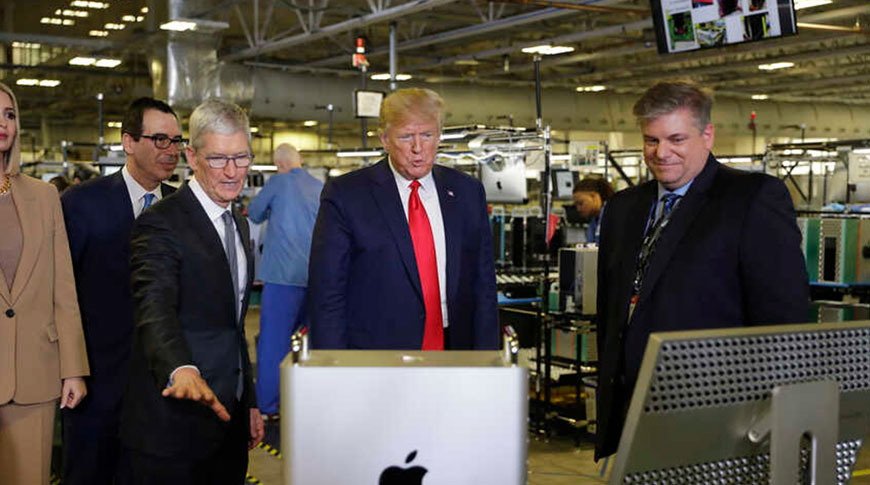Apple's $900 million tariff bill in Q3 is a sign of Tim Cook's supply chain mastery
Both by getting an exemption, and by toiling for seven years to diversify its iPhone manufacturing efforts outside of China, the $900 million estimate of tariff impacts in the third quarter is paltry compared to what it could have been, and is for other companies.

Part of Apple's current iPhone 16 range
An unusual part of Apple's latest earnings call was when Cook broke off from recounting the quarter in question, and instead offered what he called color on the future. Really he was speaking about tariffs, which were introduced in Q2 but sufficiently anticipated in Q1 that it had an impact on Apple sales.
Cook had already said that Apple used a "build ahead" approach, to get more imports done before the tariff announcement for the third quarter. While he didn't comment on the unexpectedly higher severity of Trump's tariffs, he said that Apple estimates that "the tariffs will add $900 million to our costs for the third fiscal quarter."
One of the analysts commented on that in a follow-up question, and was clearly surprised by the relatively low impact versus what was expected.
Anyway, there was clearly anticipation by Apple in Q1 before the tariffs were announced. Then the tariffs were revealed to be extraordinarily higher than expected after the quarter ended, and initially Apple had to believe it was subject to the full tariff costs.
While not specifically aimed at Apple, maybe, there is presently an exemption that gives the company a big break. Trump later denied it was an exemption, and made it temporary, and said Apple would come under a different "bucket" of tariffs after a semiconductor investigation.
Apple can't have relied on getting an exemption, despite getting one in Trump's first term. And Cook notes that while the vast majority of Apple's products are exempt, the 145% China tariff still stands for "some of our US AppleCare and accessories businesses." This means service parts, iPhone cases, and the like are going to get hammered.
Then the issue of the exemption being temporary is significant because Cook would only speak about the June quarter. That's the last quarter before the introduction of the iPhone 17 range -- those new models will be in greatest demand in the following two quarters.
So while Trump changes his mind repeatedly, at present it's likely that Apple's tariff exemption will have ended by then. Whatever tariffs are in place then will hit Apple at its peak iPhone sales period.
Even just for June, though, Apple has worked to reduce the tariff impact by rerouting its delivery line. From now on, Apple plans to import more iPhones into the US from India, instead of from China.

Tim Cook shows Trump the then-new 2019 Mac Pro in production -- image credit: Apple
"For the June quarter, we do expect the majority of iPhones sold in the US will have India as their country of origin," he said, "and Vietnam to be the country of origin for almost all iPad, Mac, Apple Watch, and AirPods products sold in the US."
Apple can't avoid tariffs
Trump's "reciprocal" tariffs apply to every country Apple works with. So if the temporary exemption is removed, Apple does not get a free pass for importing from India -- not even if it were possible to make all iPhones there.
That is not possible now, and it never will be. Even as Cook framed Apple's position as best he could, he still had to refer to only a "majority" of US iPhones being made in India.
There will be iPhones imported into the US from China, and there always will be. Apple cannot divorce itself from China entirely.
Consequently, if the exemption is lifted, and if Trump continues with the 145% surcharge, Apple would be hit by that. In reality, it's impossible to predict how Trump will next change his mind, but Apple has to be prepared for the worst case.
So there will be iPhones imported from China, and while Cook said the $900 million figure was dependent on there being no changes, he knows there will be. It's just not possible to calculate today what they may be.
"I don't want to predict the future because I'm not sure what will happen with the tariffs, and there is the [semiconductor] investigation going on," he said.
"It's, you know, very difficult to predict beyond June," he added, before repeating that even the June quarter isn't certain.
Apple's global spending to minimize tariffs
What is certain is that rejigging supply and delivery lines to have the US get mostly Indian-made iPhones has already been an expensive task. Cook alluded to the change by mentioning that now "China would continue to be the country of origin for the vast majority of total product sales outside the US."
Apple isn't even close to completing its plans to reconfigure its delivery lines. The cost of those moves won't entirely fall into the June quarter, as some have been paid already and some are yet to come.
What is clear, though, is that despite all of this massive global supply line change, and despite the current exemption, Apple is still on the hook for $900 million just because of these tariffs. It could have been a lot worse, and it was expected to be about 10 times that in just the third quarter.
And that $900 million is for the June quarter alone, the quarter before the next iPhone launch.
It used to be the case that Apple's latest iPhones were always built in China, and because of the complexity of manufacturing, other countries tended to work on older models. That's been changing, as iPhone 17 models were being developed in India as of October 2024.
And like Tim Cook said, half of the iPhones sold in the quarter in the US were made in India.
June is just the quietest iPhone quarter
But investment firm Morgan Stanley has speculated that Apple could produce its higher-storage models in China. The reasoning is that Apple's margins on those models could be sufficient to cushion the tariff impact.
Whatever Apple does to mitigate tariff costs, though, there is a limit. For its usually quieter June quarter, Apple says it will still be out $900 million -- so there's simply no guessing what the tariff impact will be in the busier September and December quarters.
Read on AppleInsider

Comments
Actually, neither of those is a scandal at all, and you thinking that they are reveals more about your ignorance of how difficult this is to manage than it does about Apple.
----
"First, Trump’s tariffs will reduce US producers’ competitiveness. Tariffs are often discussed as a tax on consumption, which of course they are. Less noted is that they are also a tax on business investment. A little over half of US imports are industrial supplies and materials, capital goods, and automotive parts. By making these inputs more expensive, tariffs will make it harder for American manufacturers to maintain low prices and expand output and hiring.
This is not just a theory. Because Trump waged a (relatively scaled-down) trade war during his first term, we have ample evidence to assess the current conflict. US Federal Reserve economists Aaron Flaaen and Justin Pierce estimate that US manufacturing-job losses due to costlier inputs were five times larger than manufacturing job gains from import protection during the 2018-19 trade war."
----
https://www.aei.org/op-eds/trumps-tariffs-wont-bring-back-manufacturing-jobs/
My main concern is not that prices will go up but rather materials will stop being shipped to the US. We already have see container ships leaving China dropping significantly in the last month. It's going to be like COVID again. All the stuff that the US uses comes in bottles made in China. That supply will dry up soon even though a large amount of items like that were imported in the last few month to stock up ahead of the tariffs. Then there will be a double whammy. Tariffs increasing the cost of goods for everyday items plus the price increases due to poor supply levels.